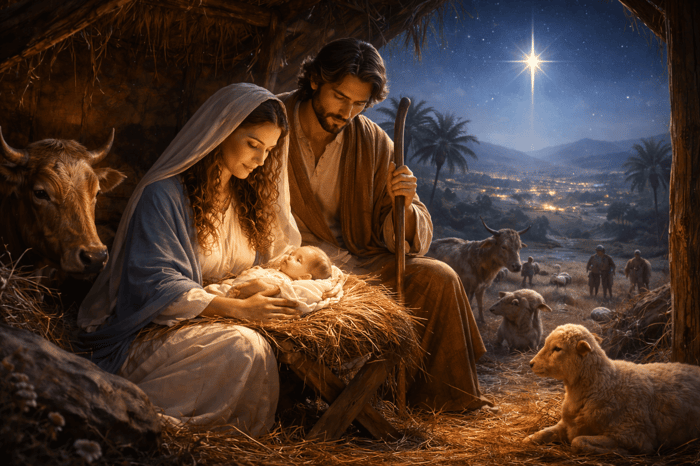Table of Contents
The Christmas story is one of the most beloved stories in the Bible, celebrated worldwide as a reminder of God's love and promise. The Gospel of Matthew presents a unique perspective on Jesus' birth. While other Gospels focus on different aspects of the Nativity, Matthew emphasizes the fulfillment of prophecy and highlights Jesus as the long-awaited King of the Jews.
Let’s explore the key points of Matthew’s Christmas story, its significance, and how it connects to the overarching message of the Bible.
The Announcement of Jesus' Birth
In Matthew 1:18-25, the story begins with Joseph learning of Mary’s miraculous pregnancy. Mary was betrothed to Joseph, but she was found to be with child through the Holy Spirit before their marriage. This caused confusion and concern for Joseph, a righteous man who wanted to handle the matter discreetly.
An angel appeared to Joseph in a dream, reassuring him:
"Joseph, son of David, do not be afraid to take Mary home as your wife, because what is conceived in her is from the Holy Spirit. She will give birth to a son, and you are to give him the name Jesus, because he will save his people from their sins." (Matthew 1:20-21, NIV)
This passage emphasizes the divine nature of Jesus’ conception, fulfilling the prophecy in Isaiah 7:14:
"The virgin will conceive and give birth to a son, and they will call him Immanuel" (which means "God with us").
The Birth of Jesus
Unlike Luke’s Gospel, Matthew does not focus on the shepherds or the manger scene. Instead, Matthew highlights the role of Joseph and ties Jesus’ birth directly to Old Testament prophecies. The text simply states that Joseph obeyed the angel’s instructions, took Mary as his wife, and named the baby Jesus.
This portion of the story reveals Joseph’s faith and obedience. Despite societal pressure, Joseph trusted God’s plan. His role as a protector and earthly father to Jesus fulfills the prophecy of Jesus being descended from the line of David.
The Visit of the Magi
One of Matthew’s most unique contributions is the account of the Magi, or wise men, in Matthew 2:1-12. These men came from the East, following a star they believed signified the birth of a new king. They arrived in Jerusalem and asked:
"Where is the one who has been born king of the Jews? We saw his star when it rose and have come to worship him." (Matthew 2:2, NIV)
Their journey led them to Bethlehem, where they found Jesus and worshipped Him, offering gifts of gold, frankincense, and myrrh. These gifts were symbolic:
- Gold represented kingship.
- Frankincense symbolized divinity.
- Myrrh foreshadowed Jesus’ suffering and death.
The Magi’s visit demonstrates that Jesus’ birth was not just for Israel but for all nations. Their willingness to seek and worship Him illustrates the global impact of His mission.
Escape to Egypt and the Return
Matthew also records darker events surrounding Jesus’ birth. In Matthew 2:13-23, King Herod, feeling threatened by the prophecy of a new king, ordered the massacre of all boys under two years old in Bethlehem. This tragedy fulfilled Jeremiah’s prophecy:
"A voice is heard in Ramah, weeping and great mourning, Rachel weeping for her children and refusing to be comforted, because they are no more." (Jeremiah 31:15)
Joseph, warned by an angel, fled with Mary and Jesus to Egypt. They stayed there until Herod’s death, fulfilling another prophecy:
"Out of Egypt I called my son." (Hosea 11:1)
After Herod’s death, the family returned to Nazareth, fulfilling yet another prophecy that Jesus would be called a Nazarene. These events show God’s protection over His Son and His sovereign control over history.
Theological Themes in Matthew’s Account
Matthew’s Christmas story highlights several key themes:
- Fulfillment of Prophecy: Every event is shown to fulfill Old Testament prophecies, affirming Jesus as the Messiah.
- Jesus as King: From the Magi’s visit to Herod’s fear, Jesus is portrayed as the King of the Jews, whose reign would be eternal.
- God’s Sovereignty: Divine intervention through angels and fulfilled prophecies demonstrate God’s control and His plan for salvation.
- Global Salvation: Including the Magi signifies that Jesus came to save not only Israel but all people.
Key Takeaways from Matthew’s Christmas Story
| Aspect | Significance |
|---|---|
| Angel’s Message to Joseph | Shows Jesus' divine nature and Joseph's obedience. |
| Fulfillment of Prophecy | Confirms Jesus as the Messiah promised in the Old Testament. |
| Visit of the Magi | Emphasizes Jesus' kingship and the global significance of His birth. |
| Escape to Egypt | Highlights God’s protection and sovereignty. |
The Christmas story in Matthew reminds us of God's faithfulness, love, and plan to save humanity through Jesus Christ. It offers hope and assurance that God's promises never fail, making it a central part of the holiday celebration.




